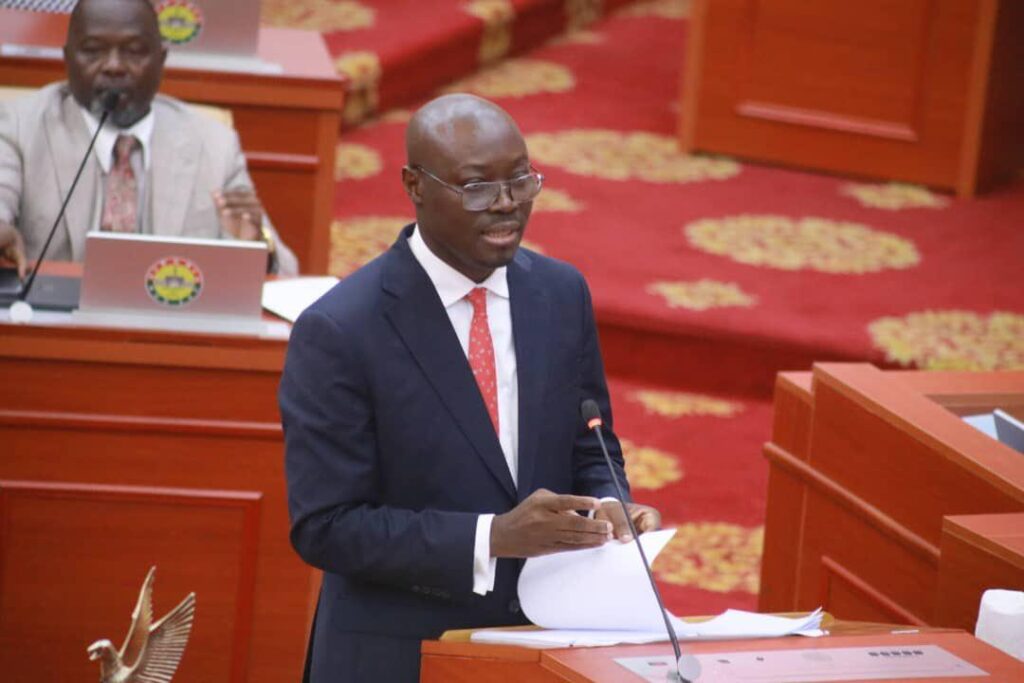A renowned Data and Policy Analyst, Alfred Appiah, has strongly argued that holistic structural reforms and transparency are critical for the new administration to achieve any real savings from its cost-cutting measures.
In an interview with The Vaultz News, the renowned Data and Policy Analyst critically analysed the new NDC government’s ongoing cost-cutting measures and their implications for Ghana’s fiscal consolidation efforts.
His insights raise fundamental questions about whether the new administration’s reductions in ministries and political appointments truly lead to meaningful financial savings or are merely cosmetic changes with little impact on the country’s broader fiscal health.
The current administration campaigned on a vision of running a lean and efficient government.
In pursuit of this promise, the government has reduced the number of ministries from 27 to 23 and appointed 54 ministers out of the proposed 60, with indications that further reductions in political appointments will follow.
While these efforts seem to align with a broader strategy of cost reduction, Appiah argued that the numbers alone do not tell the full story.
“So I think we need to take a look at the measures themselves, and whether, they are cost-cutting. So, how I like to do is, of course, have to compare them to the levels that they were.
“So there seems to be a bit of confusion in terms of the numbers. And, by numbers, I mean, by counts, right, versus, like, the cost associated with those numbers”.
Alfred Appiah, a renowned Data and Policy Analyst
He challenged some of the comparisons made between the current administration and its predecessor, particularly the claim that the previous New Patriotic Party (NPP) administration had 336 presidential staffers while the current National Democratic Congress (NDC) government has only 30.
According to him, the 336 figure included aides and support staff, a number that has yet to be fully disclosed under the new government.
A more substantive way to evaluate cost-cutting, he argued, is to analyze the budget line by line. While the government has made reductions in ministries and appointees, the compensation for Ministries, Departments, and Agencies (MDAs) has increased, partly due to a 10% rise in public service wages.
However, Appiah noted that the most significant cut has been in the allocation for goods and services, often referred to as discretionary spending.
“When you look at it, the goods and services were reduced by quite a bit. So GHS 11,500,000,000.0 in 2024, and then we are looking at about GHS 7,000,000,000 in 2025.
“Now I want you to know, though, when you look into the budgets in detail, one of the things you notice is that the MDAs, the ministry departments and agencies, still have high goods and services. Right? So the goods and services that they are summing, they are budgeting, are about over GHS 10,000,000,000.
Alfred Appiah, a renowned Data and Policy Analyst
According to Appiah, such a situation raises concerns about potential budget overruns, arguing that the ministries may argue that they budgeted for more, and if funds are not released accordingly, it could create financial tensions.

Fiscal Consolidation
Here, Alfred Appiah strongly contended that fiscal consolidation requires not just cost-cutting but a holistic approach to reducing government expenditure while maintaining essential services.
According to Appiah, despite the government’s efforts to trim spending, the 2025 budget is expansionary and is actually higher than what was planned for in 2024.
“So even though we reduced the number of ministries and did all of that stuff, the numbers themselves don’t point to something that is relatively lower compared to the 2024 levels”.
Alfred Appiah, a renowned Data and Policy Analyst
Appiah noted that the Finance Minister, in a previous engagement, had indicated that the government’s primary expenditure, excluding interest payments, should be lower in 2025 compared to 2024. However, the numbers suggest otherwise.
While the budget does include some positive measures, such as uncapping several earmarked funds to increase allocations for health and education, Appiah believes that these efforts do not amount to genuine fiscal consolidation. Instead, they reflect a shift in priorities rather than a real reduction in spending.
Long-Term Structural Changes in Public Sector Management
The conversation also touched on whether these cost-cutting measures signal a long-term shift in Ghana’s public sector management.
Even though the reductions in ministers and political appointees have not resulted in a dramatic decrease in spending, could they still set the stage for broader structural reforms?

Appiah believes that to achieve lasting changes, reforms must extend beyond the central government to include state-owned enterprises (SOEs), which have long been a drain on public resources.
“When you look at the whole of government accounts, the budget for state-owned enterprises in 2024 was double that of the central government. This means that whatever cost-cutting measures we implement at the ministry level must also be reflected in SOEs”.
Alfred Appiah, a renowned Data and Policy Analyst
A major issue with SOEs is the perception that since they generate their own income, they have the liberty to spend as they wish.
However, Appiah challenged this notion, citing the Electricity Company of Ghana (ECG) as an example.
“Because think of it, ECG, for example. When ECG has issues, it comes back to the central government. The central government is bailing them out, essentially. Like, every month, there’s a transfer of an amount of money that could have gone towards other essential services, by the central government to pay ECG’s losses.
“While in an actual sense, ECG should be paying dividends to the central government. And so I think that it’s good that the government is showing commitment to try to reduce waste, and all of that. But I think there is, lot of that needs to happen in the state-owned enterprises”.
Alfred Appiah, a renowned Data and Policy Analyst
Digitalization in Reducing Waste
Another key area of reform, according to Alfred Appiah, is public procurement, which has historically been plagued by inefficiencies and corruption.
The Finance Minister has indicated plans to integrate the Ghana Integrated Financial Management Information System (GIFMIS) with the Ghana Electronic Procurement System (GHANEPS) to improve transparency and accountability.
“The idea is that all procurement contracts should go through the electronic system and be linked to the government’s accounting system. This would ensure that only approved expenditures are processed”.
Alfred Appiah, a renowned Data and Policy Analyst
However, he noted that despite these digitalization efforts, large and controversial contracts, such as the Strategic Mobilization Limited (SML) contract and the recent airport e-gate scandal, often bypass these systems.
“If you visit the GHANEPS website, you won’t find these big contracts listed. This means that while we talk about digitalization and transparency, in practice, these systems are being sidestepped”.
Alfred Appiah, a renowned Data and Policy Analyst
Governance and Accountability: The Real Challenge
Alfred Appiah emphasized that the fundamental issue is not a lack of policies or systems but weak governance structures that allow individuals to bypass controls without consequences.
“We know what the problems are, and we often propose the right solutions. But the real issue is implementation,” he said.
For instance, Appiah noted that under Ghana’s current International Monetary Fund (IMF) program, procurement and payroll reforms were key areas of focus, yet two years into the program, the same problems persist.

“We have heard these promises before—linking procurement to financial management systems, eliminating ghost names from payrolls, and reducing waste. But until governance improves and people are held accountable for circumventing these measures, we will continue to face the same challenges”.
Alfred Appiah, a renowned Data and Policy Analyst
In his final remarks, Appiah posited that the government’s efforts to cut costs by reducing ministries and political appointees represent a step in the right direction, but they do not necessarily translate into meaningful fiscal consolidation.
For him, budget figures indicate that overall expenditure remains high, and significant risks of overspending still exist.
Moreover, without extending reforms to state-owned enterprises and addressing procurement inefficiencies, the broader goal of efficient public sector management will remain elusive.
While digitalization efforts could help enhance accountability, their effectiveness depends on strict enforcement and governance reforms.
Ultimately, as Appiah noted, Ghana’s fiscal challenges are not due to a lack of good policies but rather a failure to implement them effectively.
He emphasized that without a strong commitment to real structural reforms, good governance practice and accountability, cost-cutting measures will remain symbolic rather than transformational.
READ ALSO: ‘Electricity Not Free’, Users Must Pay Now
















